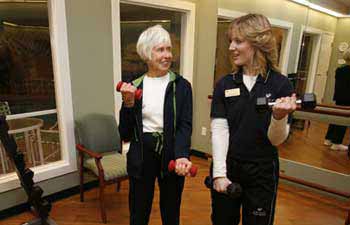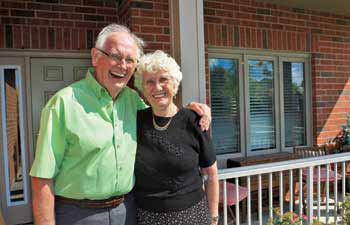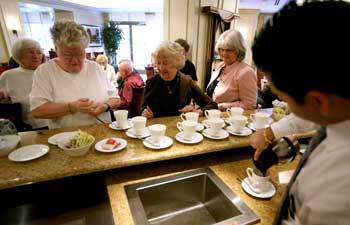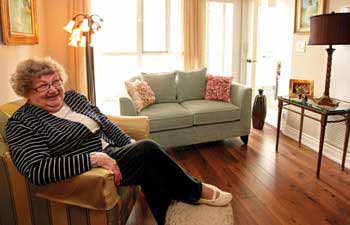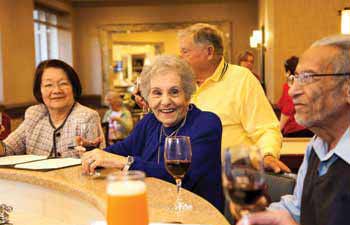We're here to help Canadians find comfortable living, from downsizing empty nesters as young as 40, to those in their 70's or 80's, and older, who are ready to move into one of today's exceptional seniors' care residences. Here's a look at all your options.
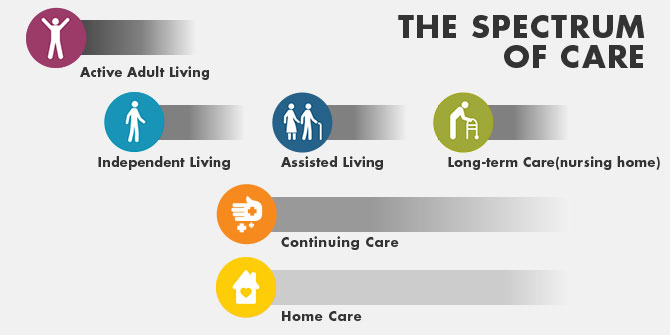
Lifestyle and Care Options
Who is it for?
Older couples and singles. People in their 50’s and older who have emptied the nest find active adult an ideal lifestyle choice. These purpose-built houses or apartments, sometimes in planned or gated communities, are not necessarily 55 plus only, but they are built with a suite of services and features that appeal to a peer group of people this age. Many include golf courses, art studios and similar hobbies.
Read more about adult lifestyle communities
What is the lifestyle?
Aging people in these types of communities may hire off-site home care and other support. People may end up living here for several years or even decades, possibly moving onto a retirement home from here.
Who is it for?
Independent seniors who’ll enjoy a vibrant community of fellow seniors. Enjoy increased social opportunities surrounded by people similar in age. On Comfort Life, we include apartments in both active adult lifestyle communities and retirement residences.
Read more about senior apartments
What is the lifestyle?
Conveniences available can make your life easier. Housekeeping and use of community amenities are often included by residences. Dining is also, in some cases. Apartment living is a sweet spot for people who don’t need care but like being surrounded by peers.
Who is it for?
Independent Older Adults. It's the most typical senior living model, ideal for those who want to live in a community of people their age with similar interests, and have all of their daily tasks taken care of. These residents are in good physical and cognitive health and need only some light assistance with tasks such as laundry, transportation and meals.
Read more about independent senior living
Is care provided?
Meals and housekeeping typically included with little to no healthcare. Off-site home care and support available for additional fees. See our Home Care section for services in your city.
Who is it for?
Seniors needing a little assistance. Ideal for residents of all ages with some limitations in physical/cognitive health, assisted living communities are designed for residents requiring on-site assistance with personal care, mobility, medication management and support.
Read more about assisted living seniors' care
Is care provided?
Daily support and personal care, meals and medication assistance included. Additional companionship care may come at an extra cost.
Who is it for?
Seniors requiring 24 hour care. Intended for seniors requiring access to 24-hour care and daily support services for physical and/or cognitive conditions, as deemed eligible by social service agencies. A wide range of care and different levels of service, including for Alzheimer's and dementia, make this an ideal community for a wide variety of people.
Read more about long term care homes
Is care provided?
All inclusive 24-hour care and support. Personal care, hygiene, and administration of any medicines. Routine doctor check ups may also be included. Additional companionship care may come at an extra cost. Some people may also refer to these as skilled nursing care facilities.
Who is it for?
When extra care is needed at home or in a retirement community. Ideal for individuals who want to remain at home with assistance from a home care agency, including the chronically ill, or people recovering from illness or surgery. Agencies usually charge an hourly fee to provide a range of medical and non-medical services for personal care, homemaking, meal preparation, transportation and social support.
Read more about home care services
Is care provided?
Any type of home support (housekeeping, meal preparation), personal support (hygiene), companionship or medicine administrtion may be available at various costs.
Who is it for?
When families need to take a break from caregiving, several Canadian provinces support time off, or respite. Respite care is available through home care services and from retirement homes, as well as other healthcare services. Retirement homes offer a valuable alternative for families, given that they have a ready-made community of peers for the elderly, and they offer many healthcare services. Caregivers can take a break as short as 24 hours or up to 90 days annually, depending on what province you live in. Access to this service is often the result of a recommendation from government services.
Read more about respite care retirement homes
What care is provided?
Round the clock medical supervision for those with dementia or other serious health concerns. Personal care for various ADLs. Administration of any medicines. Routine doctor check ups may also be included.
Who is it for?
This is ideal for those still recovering from surgeries (notably knee or hip surgery), who are done with hospitalization, but not quite ready to be independent. It's a unique service offered by some retirement homes and is also available through home care services. This service allows seniors to fully recover with the exact amount of healthcare needed. Retirement homes offer a clean, safe medical environment that may include an on-site doctor or nurses, as well as spa services and other amenities. It's an ideal way to fully recover.
Read more about convalescent care in seniors' homes
What care is provided?
Round the clock attention is available, should an emergency arise. Personal care for various ADLs if needed. Administration of any medicines. Routine doctor check-ups may also be included. Spa services, physiotherapy and other options are available from some residences or providers.
Note that not all brief stays entail care requirements as seen in our fuller treatment of short term guest stays.
Who is it for?
This type of care focuses on helping seniors who face serious illness that may be terminal. Home care service providers offer palliative and hospice care in the home. Many retirement residences offer this service to clients in their care who develop serious illness, while some accept new residents facing a terminal diagnosis. This service gives seniors professional healthcare attention in a comfortable environment, where they can keep contact with some peers.
Read more about palliative care in retirement homes
What care is provided?
Professional healthcare is available from some retirement residences and many home care providers. Many retirement homes offer extra services and care like a spa, physiotherapy and other alternatives.


